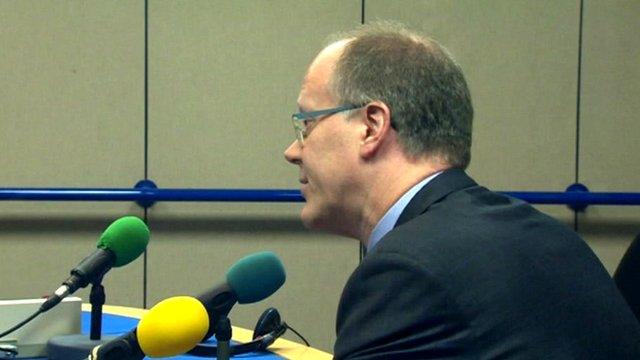Savile allegations 'will not go away'
- Published
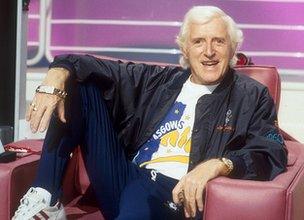
Children's show Jim'll Fix It ran from 1975 to 1994
The BBC director general has apologised to the alleged victims of Sir Jimmy Savile and promised a "comprehensive investigation" once the police have completed their own inquiries.
But if George Entwistle hoped this would kick the issue into the long grass - as some have suggested - he may be out of luck.
This story has the potential to run and run, as the continuing newspaper and broadcast coverage has shown.
The unearthing by Channel 4 News of TV footage from 1974 showing Freddie Starr on Savile's show, external Clunk Click is the latest scoop to emerge, as journalists race to uncover new evidence about what went on at the BBC in the '70s, '80s and '90s.
It's unlikely to be the last.
Not only have all Savile's alleged victims been encouraged by the Corporation to tell their stories to the police, but Mr Entwistle has urged "any staff member past or present" who "knows anything they think might help" to come forward, as he pledged the BBC's full co-operation, external with the Met.
That is unlikely to curb the stream of allegations emerging in the media.
At the weekend, alongside more lurid claims in the tabloids about other celebrities and BBC employees, came a string of eye-witness accounts on the BBC's own programmes from well-known broadcasters, deploring the way women were treated in the 1980s.
On Radio 4's Today programme, the BBC 6 Music DJ Liz Kershaw said, external that in the 1980s she was routinely groped by a Radio 1 colleague while she was live on the air. She said Savile's behaviour was an "open secret" at the station, where the culture "was like walking into a rugby club locker room and very intimidating for a young woman".
On the Andrew Marr Show on BBC One, TV and radio presenter Sandi Toksvig said she was groped on air 30 years ago by a "famous individual". She did not name them, or where she was working at the time, but said other staff thought it was funny.
On BBC One's Question Time, Janet Street-Porter said that when she became a BBC executive in 1987 she "was aware of the rumours about Jimmy Savile" and there was "definitely a culture in light entertainment of inappropriate sexual behaviour", though not necessarily with underage children.
Later, in the Daily Mail, external, she said the same attitudes prevailed at her previous employer, LWT. "In the male-dominated world of television and radio entertainment in the Seventies, Eighties and even Nineties, women were all-too-often regarded as something to have smutty fun with. If we complained, we were being silly."
Now the backlash has begun.
On Radio 5 Live, former Radio 1 DJ Mike Smith said, external he didn't recognise the culture described by Liz Kershaw and said what went on in the studios was just "mucking about".
He told Richard Bacon the "witch-hunt must stop" and accused Liz Kershaw of "smearing" other presenters by not naming the man who routinely assaulted her.
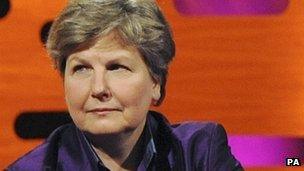
Sandi Toksvig is amongst the broadcasters who have spoken out about the culture in broadcasting
On the same programme, Jackie Brambles, who was at Radio 1 at the same time, told Bacon it was "more like a school common room than a rugby club."
Sandy Toksvig has now told the Guardian she was distressed that her comments had been used as "stick to beat the BBC with".
In a statement she said: "Whilst the recent manifold revelations regarding the abuse and mistreatment of women in broadcasting have focused on the BBC, I would like to clarify that I consider this a culture endemic across the whole of radio and television and is certainly not limited to the BBC."
The Daily Telegraph's radio critic Gillian Reynolds said she agreed with Claire Fox of the Institute of Ideas who suggested on Radio 4's Any Questions that it would be better to let sleeping dogs lie.
Reynolds wrote, external: "I have little doubt that some of Savile's activities were appalling, probably even criminal. He said as much himself in his autobiography. I knew one of his Radio 1 producers, now dead, who was appalled by his behaviour and said so at the time.... But when, as here, the explosive combination of prurience and vengeance are let loose upon the airwaves, I tend to wonder for whose benefit."
But on its news pages, the Telegraph reported Channel Four's discovery of footage showing Freddie Starr on Savile's show.
It said his lawyer had released a statement saying the star had been "mistaken" when he denied meeting a woman who has accused him of molesting her, or appearing on the programme.
The statement went on, external: "However, this does not detract from the fact that Freddie vigorously denies the awful allegation that has been made by Karin Ward, which despite this footage is still totally unsupported and uncorroborated by any other evidence."
The Daily Mail and Daily Mirror put the same story on their front pages.
Meanwhile, the Guardian and other papers are pursuing the links between Savile and the Jersey care home scandal: "The former head of the Jersey child abuse investigation has said he now suspects that Sir Jimmy Savile was implicated in the Haut de la Garenne children's home abuse scandal," reported The Guardian, external.
Lenny Harper said he now had "no reason to doubt" that Savile was involved in indecent assault at the notorious Jersey children's home, despite there being insufficient evidence to question the Jim'll Fix It star when he was alive.
And there's still the question of who knew what, and when, about the BBC's Newsnight investigation, which was shelved last year, despite uncovering much of the material shown in last week's ITV documentary.
The Daily Mail said, external: "BBC director-general George Entwistle yesterday admitted knowing about the Newsnight Savile investigation when he ploughed ahead with eulogies showering tributes on the presenter. It came as he ordered a belated inquiry into the abuse scandal and offered an apology to Savile's victims."
The BBC has strongly denied that pressure was brought on Newsnight to drop the investigation. The programme's editor Peter Rippon insisted on the BBC Editors blog that it was his decision alone.
But like so many aspects of the Savile allegations, the story refuses to lie down.
- Published8 October 2012
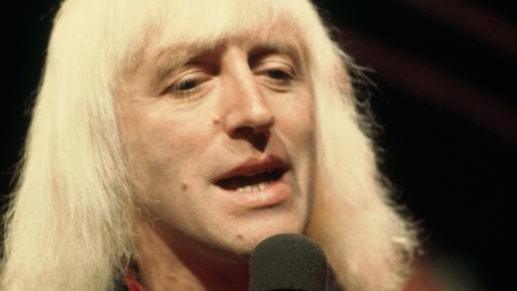
- Published9 October 2012
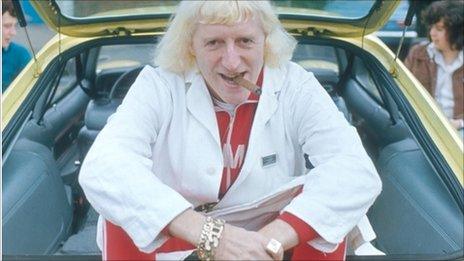
- Published8 October 2012
- Published8 October 2012
